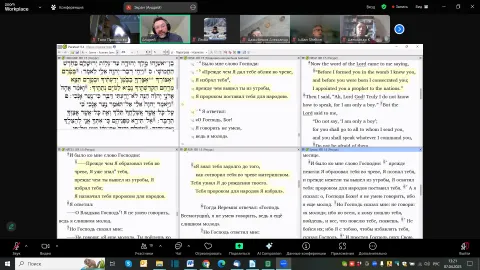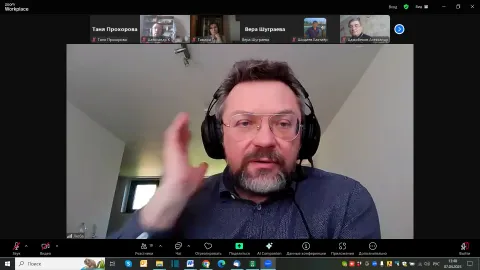On April 7-10, IBT held a webinar on the book of Jeremiah. It was led by IBT's translation consultant, biblical scholar Dr Andrei Desnitsky. The webinar was attended by representatives of IBT's Abaza, Balkar, Chamalal, Kalmyk, Kabardian, Karachay, Khakas, Ossetic and Yakut projects, as well as partner organisations working on OT translation into Kyrgyz, Modvin-Erzya and Tajik.
The book of Jeremiah is a long, complex text with 52 chapters and it was impossible to go through the entire book verse by verse in four days, so the experienced instructor structured the webinar programme to focus on the most important and difficult passages. The text was worked through carefully and in great detail. Desnitsky gave thorough answers to the students' questions, even when those touched on other books of the Bible. Much time was also given to independent group work and discussion of potential translation solutions. Desnitsky asked the translators many thought-provoking questions, pointing out the provocative peculiarities of prophetic discourse, and the participants had to work hard to find translation solutions.
The main topics covered in the webinar included: the context, content and style of the book of Jeremiah; characteristics of the prophetic genre; prose and poetry in the prophetic books; terms and key concepts; historical and cultural context in translation; dialogue and internal monologue; emotional expression; politeness and discourtesy in direct speech.
Even those translators whose projects already include a complete translation of the Bible and who are revising the text in preparation for the second edition reported that they had made important discoveries and, as a bonus, received personal spiritual edification from a fresh look at the text. One such discovery for most participants was the extreme sincerity with which the prophet Jeremiah expressed his feelings before God. One translator asked whether it might be better to simply delete two verses from one of the chapters, because a prophet who proclaims the will of God should not curse his mother and the day of his birth (20:17-18) -- this contradicts the entire teaching of Scripture. Dr. Desnitsky reminded the translators that it is a unique feature of the Bible to show people as they are, not only as they should be. He also mentioned the speeches of Job as an example of an even more open expression of the depths of the human heart.
In their feedback, the audience appreciated the instructor's ability to convey information clearly, the logic of the presentation, the clarity and relevance of the passages chosen for joint consideration and, as usual, the benefits of discussing the difficulties of translation together. As one translator summed up the general mood of the webinar, ‘We all listen to each other. Our colleagues' assumptions are valid, and it’s possible that our words have helped someone to understand the text better.'


